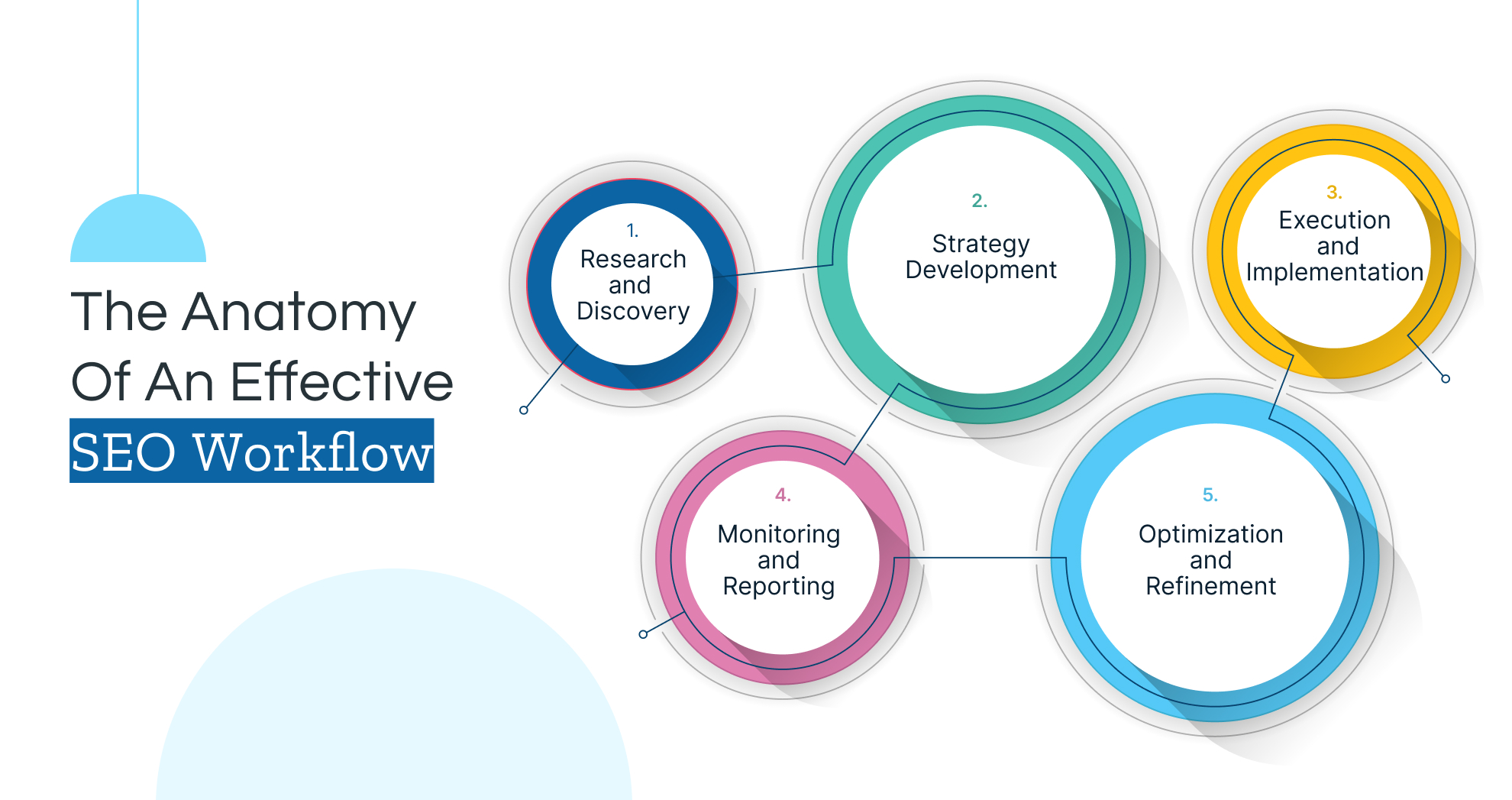What is SEO Workflow and Task Management?

 12.5 min
12.5 min
The Secret to SEO Success: It’s All About Workflow!
SEO is a strategic game where timing, execution, and organization decide who ranks highest on search engines—not only about keywords and backlinks. Imagine a blindfolded marathon running—chaotic, right? Without a task management system and organized SEO process, that is exactly what SEO looks like.
From technical audits to keyword research to content development and link-building, SEO is a constant fight. The drawback is that even the greatest plans fall apart under poor management without a clear SEO workflow procedure. Oversaw missing deadlines. Tasks overlapping? unequal tracking All these errors lower your rating while your rivals fly.
Learning SEO workflow management is therefore non-negotiable. An aimless effort is not the same as a simplified, result-oriented plan. From optimization to analytics, a well-considered SEO jobs and workflow approach guarantees that every step fits perfectly into a defined system, thereby increasing productivity and impact.
How therefore can you design a flawless, orderly SEO process with consistent results? Let's dissect it piecemeal, methodically.
Step-by-Step Breakdown of The SEO Workflow Process

SEO is a methodical process requiring accuracy, patience, and a great deal of strategic thinking—not magic. Even the best intentions collapse without a strong SEO workflow and task management system. But when you dissect it methodically, SEO turns into a well-oiled engine constantly producing results.
The SEO workflow follows this:
Step 1 - Research and Discovery: Uncovering Hidden Opportunities
Consider this as the reconnaissance stage—you are compiling data prior to starting a comprehensive search engine optimization effort. This phase entails delving further into keyword research, following market trends, and competitive analysis.
- Researching keywords with great impact that fit search intent is vital.
- Examining top-ranking rivals helps one to understand what is working—and not working.
- Knowing user behavior will help one to properly customize material.
- Technical Audits: Finding website problems likely to affect rankings.
Without careful study, SEO is like aiming arrows in the dark—you could strike something, but it won't be what you intended for. Here, a firm basis prepares the ground for a robust SEO process to come.
Step 2 - Developing Your Strategy: Creating a Roadmap to Rule Rankings
Building a fighting strategy comes first after the research is underway. This stage is where you create an SEO road map and match objectives with a disciplined method of SEO workflow management.
- Content Strategy: Should you address these subjects? Which structure—blogs, videos, infographics—works best?
- Optimizing titles, meta descriptions, headings, and content for best impact forms the on-page SEO plan.
- Ensuring site speed, mobile friendliness, and clean URLs addresses technical SEO issues.
- Strategies for link-building: spotting chances for excellent backlinks.
A well-written plan guarantees that your SEO workflow is simplified, so avoiding the waste of time on useless strategies.
Step 3 - From Plan to Action: Executing SEO with Precision
It's time now to get your hands filthy. Strategies become quantifiable results only in execution. This phase calls for flawless coordination of SEO chores and workflow to guarantee everything operates as it should.
- Writing excellent, keyword-optimized, value-delivery material will help your content creation and optimization process.
- Enhancing site architecture, internal linking, and image optimization on page level.
- Engaging industry experts and acquiring backlinks helps to build links.
- Resolving crawl problems, increasing site speed, and boosting mobile performance are technical fixes.
The secret of execution is Keeping everything ordered. With the correct SEO workflow management, teams can handle various jobs without missing deadlines or losing momentum.
Step 4 - Tracking and Reporting: Measuring What Matters
What gets measured gets improved. SEO isn’t a set-it-and-forget-it game—it takes ongoing monitoring and analysis to track progress.
- Analytics Tracking: Using tools like Google Analytics to measure traffic, bounce rates, and conversions.
- Rank Monitoring: Checking how keywords are doing and modifying strategy accordingly.
- Competitor Benchmarking: Staying ahead by examining what your rivals are doing differently.
- Performance Reports: Breaking down victories, losses, and actionable ideas for future improvements.
A data-driven SEO process guarantees that every choice is supported by actual findings rather than only conjecture.
Step 5 - Refining for Growth: The Never-Ending Cycle of Optimization
Instead of a sprint, SEO is a marathon. One always has room for development even after running a perfect campaign. Here is where ongoing improvement keeps your website competitive and relevant.
- Changing older content will help it to remain ranking great.
- Correcting new problems that develop over time is part of technical SEO enhancement.
- Improving site navigation and interaction will help to optimally retain users.
- Keeping up with Google's often changing ranking criteria helps one adapt to algorithm updates.
Task management and SEO flow that works well depends on flexibility. You will be passed by your rivals the instant you stop optimizing.
SEO Workflow Streamlined for Success!
From Measurable Results to Speedy Scaling , We curate and implement Robust Strategies for Organic Growth!
Learn How!
Secrets of SEO Task Management: The Master Guide for Success
Managing SEO is about applying the correct techniques precisely, not only about knowing the correct ones. Even the best efforts can be undermined by a sloppy, disorganized task management and SEO workflow system. How do effective SEO teams keep ahead? They assign effectively, track development like pros, and have a disciplined approach that allows for easy communication. Let’s draw back the curtain on the secrets underlying a well-managed SEO workflow process.
1. Breaking Down the Big Picture: Setting the Right Foundations
Before getting into execution, you need clarity. SEO isn’t a one-time effort; it’s an ongoing cycle of analysis, execution, and refinement. That’s why breaking down SEO into clear, manageable tasks is crucial.
- Clearly state your objectives; more conversions, more organic traffic, better rankings, or something else entirely. Specify success criteria up front.
- Sort your chores; not all SEO jobs are equal. Start with high-impact tasks like improving high-value content or resolving technical SEO problems.
- Divide big undertakings into smaller, bite-sized tasks such that every activity is quantifiable and trackable.
A structured SEO workflow allows teams to focus on execution without getting lost in the chaos.
2. Effective Delegation and Assignment: The Value of Planned Action
Success with SEO isn't a one-person job. It calls for perfect cooperation among strategists, writers, developers, and analysts. The secret lies in the smart distribution of work.
- Match Tasks to Skill Sets: Content strategists handle keyword mapping, writers optimize content, and engineers tackle technical improvements.
- Use Workflow Automation: Assigning regular SEO duties & workflow automatically saves time and reduces errors.
- Set Deadlines and Ownership: Every task should have clear accountability to prevent bottlenecks.
Without adequate SEO workflow management, tasks slip through the cracks, deadlines get missed, and rankings suffer.
3. Tracking Progress and Time Management: Staying on Top of Your SEO Game
SEO is about making sure that work is done effectively rather than only about executing the tasks. Monitoring development helps maximize processes, stop wasted effort, and shorten turnaround times.
- Track measures including organic traffic increase, rankings, and click-through rates (CTR) by setting Key Performance Indicators (KPIs).
- Use time-tracking tools: Knowing how long projects take can help to simplify next procedures.
- Track Task Completion Rates: See obstacles before they affect performance.
A well-organized SEO workflow guarantees that every step is quantifiable, so subsequent improvements will be more successful.
4. Effective Communication and Collaboration: The Glue That Holds SEO Together
SEO is a team game, hence even the best plans collapse without effective communication. Imagine developers working on technical fixes unknown to content teams; this causes uncertainty and inefficiencies.
- Use centralized communication tools: Slack, Trello, Asana; choose a platform where SEO teams might work in real time together.
- Daily check-ins lasting ten minutes help to keep everyone in line on priorities.
- Maintaining SEO playbooks will help to guarantee consistency between efforts.
Task management and a flawless SEO process help to improve productivity by removing misunderstandings.
5. Overcoming Common Challenges: Tackling SEO Roadblocks Like a Pro
SEO is not 24/7 sailing under perfect conditions. Problems arise; your response to them will define success. Among the toughest obstacles are some:
- Constant Algorithm Updates: Google's ranking criteria change constantly; keep informed to avoid fines.
- Content Bottlenecks: Authors battling deadlines? Put editorial calendars and automated processes into use.
- Technical SEO fixes are slowly implemented by developers juggling several priorities? Use ticketing systems to expedite requests for action.
A dynamic SEO workflow management solution anticipates these issues and keeps your strategy fluid.
SEO Tools & Techniques: Optimizing Your Process
Even the best SEO techniques collapse without the correct tools and automation. The great news is Powerful programs abound meant to simplify task management and SEO process. Allow us to explore the game-changers.
1. Revolutionary SEO Tools: Must-Haves for Every SEO Expert
- Google Search Console: Your direct portal to Google for site performance monitoring.
- Ahrefs & SEMrush: Competitive analysis, keyword research, and backlink tracking—these tools handle it all.
- SurferSEO: AI-powered content optimization guaranteed to improve your page ranking.
- Screaming Frog: Before your ranks suffer, spot and resolve technical SEO problems.
These technologies turn search engine optimization chores and workflow into a data-driven process, therefore guiding every decision toward accuracy and intelligence.
2. Advanced Task Management Solutions: Keeping SEO Execution on Track
SEO is about how you handle team effort rather than only on facts. The greatest instruments for handling SEO processes consist in:
- Trello & Asana: Use basic drag-and-drop capability in Trello & Asana to track SEO activities.
- ClickUp: A feature-rich tool for automating regular SEO chores, tracking development, and creating deadlines.
- Notion: Consolidate team collaboration, SOPs, and SEO tactics into one location.
- Jira: Perfect for technical SEO teams collaborating with developers on intricate site repairs
Including these instruments into your SEO process guarantees flawless implementation and helps you to remove inefficiencies.
Key Trends and Advanced Strategies You Need to Know About the Future of SEO
SEO is not what it was in past years. It is smarter, more dynamic, and changing at explosive pace. What worked yesterday could be out of current tomorrow. How thus can one keep ahead of the curve? Simple: by knowing where SEO is headed and quickening your own adaptation pace above that of your rivals.
Let's explore the most recent developments in advanced technologies and hottest trends influencing SEO going forward.
1. The Next Era of SEO: Emerging Trends That Will Define the Industry
SEO's guiding principles are changing. Businesses who neglect to change will find it difficult to remain visible; Google's AI is getting more sophisticated, user intent is taking the stage. This is what is changing—and how you could keep ahead.
Optimizing Voice Search: The Next Horizon in SEO
"Hey Google, where is the top Italian restaurant found?" Sounds familiar." Optimizing for voice search is not optional anymore; it is rather necessary as it is exploding.
Why?
- Nowadays, half of searches are spoken in nature.
- Search behavior mostly consists of mobile and smart devices.
- Longer, more conversational questions based on voice inquiry abound.
How best to maximize for voice search?
- Write in natural language, therefore reflecting the actual speech pattern of people.
- Think through "What's the best way to fix a leaky faucet?" long-tail keywords." rather than "leaky faucet fix."
- Optimize for featured snippets: Voice assistants adore pulling responses from position zero.
- Make sure your local SEO is excellent; most voice searches—like "best coffee shop near me"—are local.
Companies which embrace voice search optimization will rule the search results going forward.
Local SEO Innovations: Changing Things Right Now
Local SEO these days goes beyond Google My Business. It's about real-time changes, artificial intelligence-driven local ranks, and hyper personalized search results.
The biggest local SEO trends:
- Google's AI-powered local pack: The search engine is improving in displaying hyper-relevant results depending on user activity.
- More people are discovering what they need without ever clicking on a website thanks to zero-click searches.
- Nowadays, Experience, Expertise, Authority, and Trustworthiness (E-E-A-T) is absolutely important; Google supports local companies showing credibility.
How can one excel in local SEO?
- Keep your Google Business Profile current.
- Promote real consumer reviews.
- Get ready for "near me" searches.
- Help Google to know your company location by using local schema markup.
If you are not now engaging in local SEO, you are losing out on highly intent clients looking for services right now.
2. The AI Revolution: How SEO Is Changing Under Artificial Intelligence
Not only a trend, artificial intelligence is the main disruptor in SEO nowadays. From search ranking systems to content creation, machine learning is rewriting the guidebook.
AI-Driven SEO: The Transformational Agent
RankBrain, Google's AI-powered system, is now more intelligent than ever. It recognizes context, intent, and even user emotions, hence transcending keywords.
What does this mean for SEO?
- Keyword stuffing is dead: AI evaluates material not only in terms of keyword density but also in relevancy.
- Search intent is everything; Google gives pages that best address a user's actual question top priority.
- Content quality comes first; artificial intelligence can rapidly identify low-value, thin, repetitious material.
How to maximize SEO driven by artificial intelligence?
- Pay close attention to user intent; respond to questions of actual interest.
- Use AI-powered SEO tools: SurferSEO, Clearscope, and Frase help maximize content for AI-driven ranks.
- Use artificial intelligence to create content; tools like ChatGPT—yes, just like me—help provide ideas, outlines, and data-driven insights.
AI-powered SEO is already here, not some future. Either adapt or run the danger of lagging behind.
Predictive Analytics: SEO’s Crystal Ball
Imagine knowing just which keywords would rank before you begin to optimize. Predictive analytics has great power.
Using AI-powered data analysis, SEO tools now forecast:
- Which keywords will be hot next month?
- Content forms Google prefers.
- Which competing tactics will be most effective?
How to leverage predictive analytics for SEO:
- Utilize AI-powered keyword search engines.
- Examine past performance to project changing ranks.
- Test and polish plans before they become obsolete.
SEO now is about forecasting rather than reacting. Lead by adopting data-driven decision-making.
Conclusion: The Future of SEO is Here—Are You Ready?
SEO changed. Spammy backlinks and keyword stuffing days are long gone. The future rests mostly on:
- AI-driven SEO that understands user intent.
- Voice search and conversational queries taking over.
- Hyper-local SEO that targets high-intent users.
- Predictive analytics shaping tomorrow’s rankings today.
Businesses must have a strong, data-driven approach customized for long-term success if they are to really flourish in this changing terrain—not simply surface-level plans. Working with an organic SEO agency helps to make all the difference here. Using ethical SEO techniques, modern technologies, and professional knowledge will help you guarantee ongoing development and visibility in a digital environment growing more competitive.
Those companies who keep ahead of these trends will dominate the SEO scene. Among those who overlook them are... They will disappear from search results more quickly than a vanished Snapchat message.
SEO is about keeping relevant rather than only about rankings. Are you ready for personal development? Let's make sure you dominate SEO rather than merely keep it current.
FAQs
The workflow of SEO involves a structured approach that includes initial research, strategy development, implementation, monitoring, and optimization.
The four stages of SEO workflow are: Initial Research and Discovery, Strategy Development, Execution and Implementation, and Monitoring and Reporting.
SEO workflow management refers to the systematic process of organizing and coordinating SEO tasks to ensure efficient execution and achievement of SEO goals.
The SEO workflow process is a series of structured steps involved in managing SEO activities, from research and strategy formulation to execution and performance tracking.





